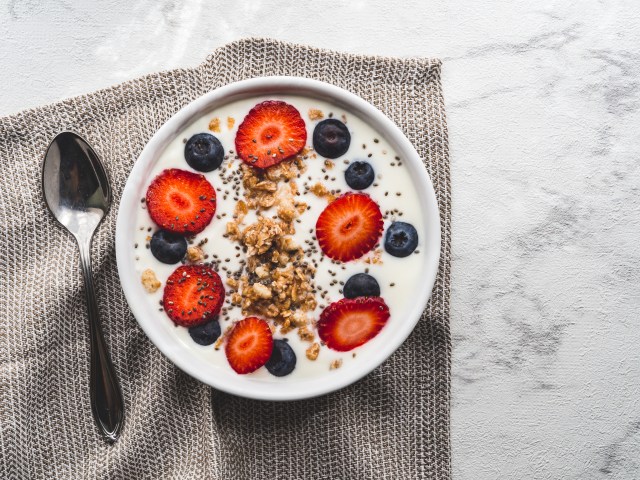Chances are, you’ve heard a marketing slogan or two about the benefits of a healthy gut. But what exactly does that mean?
Dr. Ali Rezaie, a gastroenterologist and co-founder of The Good LFE, a nutrition resource for people with digestive issues, describes the gut microbiome as “the constellation of bacteria, fungi and viruses living in our bowels.”
Disgusted? Don’t be. Your digestive tract’s good bacteria help break down food, process vitamins and even contribute to immune health.
The trouble often begins when certain bacteria overmultiply or migrate to places they don’t belong. That’s the case with a gut disorder called SIBO (small intestinal bacterial overgrowth), which now affects about 11% of the population. SIBO occurs when the small intestine is overpopulated with bacteria.
Signs of Gut Problems
Nearly two-thirds of Americans say they regularly experience gastrointestinal issues, according to the National GI survey conducted by the National Institutes of Health. Are you one of them?
If you do have an overgrowth of bacteria in your small intestine, you’ll notice. Rezaie said the imbalance can lead to a collection of symptoms that include:
- Painful bloating.
- Diarrhea.
- Constipation.
- Generally unpredictable bowel habits.
Still, gastrointestinal distress can be caused by many gut disorders, not just SIBO. Rezaie also looks for signs of these other health conditions:
- Inflammatory bowel diseases (Crohn’s disease and ulcerative colitis).
- Celiac disease.
- Gluten sensitivity.
- Stomach or intestinal infection.
- Lactose intolerance.
Finding the Root of Your Gut Issues
Different bowel disorders require wildly different diets or treatments. For instance, someone with constipation might need more fiber, while someone with SIBO could experience worsening symptoms if they overeat fiber.
That’s why it’s essential to have a doctor pinpoint the cause. Some diagnoses require a colonoscopy, yes, but not all. Rezaie said noninvasive breath tests can be used to diagnose SIBO.

3 Ways to Maintain a Healthy Gut Microbiome
It’s not always possible to prevent digestive issues. If you’ve already developed gastrointestinal problems, it’s time to talk to a doctor. But if you have no symptoms of a gut imbalance, you can follow these tips to support a happy, healthy gut.
“There is no magic specific food that can make the gut microbiome healthy,” Rezaie said.
Instead, fill your day and your plate with a combination of these foods:
- Carbohydrates (like whole grains and potatoes).
- Protein (meat, eggs, nuts and beans).
- Fat (yogurt, cottage cheese and avocados).
- Vegetables (leafy greens, carrots and broccoli).
2. Eat Foods With Gut-Healthy Probiotics and Fiber
Amy Gorin, a Connecticut-based inclusive plant-based dietitian, also suggests eating foods known to support good gut bacteria. However, if you have SIBO – an overgrowth of bacteria – you will need a tailored diet.
Here are her top three recommendations for gut-nourishing foods.
Kefir
“Kefir is a fermented liquid dairy that contains a plethora of gut-helping probiotics,” Gorin said. This creamy, drinkable yogurt is traditionally made by fermenting cow or goat milk, but brands like COYO and Biotiful offer plant-based varieties.
Research has found promising links between kefir consumption and gut balance, but more studies are needed to understand precisely how kefir affects the gut microbiome and how much you’d need to drink to influence your overall health.
What we know for sure is that kefir contains good bacteria known as probiotics.
Sauerkraut
A cup of this fermented cabbage dish includes a heaping helping of potassium and digestion-supporting fiber.
“Reach for an unpasteurized sauerkraut if you want the maximum gut health benefits,” said Gorin. “This is the type of sauerkraut that contains probiotics.”
Beans
Beans are brimming with fiber, which “helps maintain good gut health,” said Gorin. “This includes stimulating digestion and feeding the gut bacteria.”
She recommends incorporating beans into a salad or making roasted chickpeas – an easy fiber-packed snack or side dish.
Did you know that your digestive system keeps a self-cleaning schedule? Rezaie said the small intestine completes “housekeeper waves” every two hours when we are not eating.
Letting your digestive system clean itself between meals can help keep your gut bacteria balanced. Frequent snacking can disrupt the cleaning schedule and potentially contribute to bacteria imbalances.
“A reasonable rule would be to space the meals for five hours and not to eat at nighttime for an eight-hour period,” said Rezaie.
Bottom Line
Talk to a doctor if you’re experiencing frequent bloating, diarrhea or constipation. A gastroenterologist can help pinpoint the cause of your digestive woes and develop an effective treatment plan, which might or might not include dietary changes.
If you have a healthy digestive system and want to maintain the benefits of a healthy gut, focus on eating a balanced diet, enjoying probiotic- and fiber-rich foods and giving your body a break between meals and snacks.
Did you know the importance and benefits of a healthy gut? Did you learn something new? Tell us in the comments.
3 Thoughts on “Breaking Down the Benefits of a Healthy Gut”
Leave A Comment
Comments are subject to moderation and may or may not be published at the editor’s discretion. Only comments that are relevant to the article and add value to the Your AAA community will be considered. Comments may be edited for clarity and length.
















can a colonoscopy or a CT scan detect SIBO?
thanks
I have SIBO , tried pre and probiotics and antibiotics. Nothing has helped , any other suggestions?!
Hi Corrine, sorry to hear you’re dealing with SIBO. I’d check out Dr. Rezaie’s resources at The Good LFE (https://thegoodlfe.com) for general guidance. This is his specialty. Beyond that, it’s always best to work directly with a gastroenterologist and/or dietician who has experience treating SIBO. Best of luck to you!